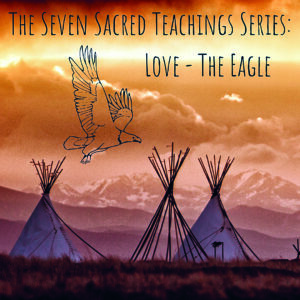Miywasin Moment: The Seven Sacred Teachings: Love – The Eagle
By JoLynn Parenteau on February 22, 2022.

Love, represented by the Eagle, is a Sacred Teaching explored in this new Miywasin Moment series.--Series art created by JoLynn Parenteau
“To feel true love is to know the Creator.”
– from Seven Sacred Teachings, Tribal Community Prevention, North Dakota
In this new series, the Miywasin Moment explores the Seven Sacred Teachings. Called the Tipi Teachings, Grandfather Teachings, or Seven Sacred Laws in other parts of Turtle Island (Native North America), these are values passed down from our Ancestors.
Indigenous ways of knowing are built upon seven natural laws, each upholding a virtue necessary to an honourable and balanced life. The tipi poles that form the structure of this traditional home each represent a value. In February, let us seek to better understand the Sacred Teaching of Love, the most powerful medicine.
Elder Hazel Dixon of Regina shared her words of wisdom with The Royal Saskatchewan Museum in a YouTube video for National Indigenous History Month in June 2020. Dixon shared that there are many ways to embrace Love.
Love the Creator, love yourself – It is said one’s first love is the Great Spirit. The father of all our People, He is the giver of life. Love given to the Creator is expressed through love of oneself. It is understood that if we cannot love ourselves, it is difficult to love others.
“Be at peace with yourself. You have to love and like yourself. Make sure not to put everyone else’s needs before your own,” teaches Dixon.
Each sacred teaching is represented by an animal. The Eagle symbolizes Love, as it has the closest relationship to the Creator. The Eagle flies highest, soaring closer to the Great Spirit than any other animal. The Eagle is said to carry our prayers to the Creator.
The Creator’s love for us is represented by an Eagle’s feather. It stands for our need for deeper understanding of ourselves and one another. Indigenous people hold the Eagle feather in great esteem and consider receiving an Eagle feather to be a powerful gift.
Love your work – “Love what you do, and do what you love,” quips Dixon. Strive to make an impact in the world in our own unique way. May your efforts nourish your soul and find favour with the Great Spirit.
Love animals – “Love the creatures of the world,” implores Dixon. North Dakota well-briety program Tribal Community Prevention’s Seven Sacred Teachings guide tells us that “the animal world taught man how to live close to the earth; the connection that has been established between the animal world and that of man has instilled a respect for all life in those who follow the traditional way.”
Eagle pairs carefully nurture their offspring, teaching and protecting their young.
Love our planet – The Turtle Lodge International Centre for Indigenous Education and Wellness at Sagkeeng First Nation in Pine Falls, Manitoba is a place for reconnecting to the Earth and sharing Indigenous ancestral knowledge, founded on the Seven Sacred Laws.
The Turtle Lodge offers children, youth, adults and Elders the opportunity to come together in a sacred environment for traditional teachings, ceremony, healing and the sharing of the perspectives of the Original Peoples of Turtle Island on Mino-Pi-Mati-Si-Win – A Good and Peaceful Way of Life.
In 2021, Turtle Lodge supported Indigenous filmmaker Erica Daniels and the late writer and Anishinaabe Elder Dr. David Courchene – Nitamabit (The Original Way and One who Sits in Front) Nii Gaani Aki Inini (Leading Earth Man) to produce a series of animated YouTube videos about the Seven Sacred Teachings. In the series’ third episode of Love, the Great Eagle teaches a young Indigenous boy to “Love the land, for it provides everything we need in order to survive.”
Love your family, friends, and neighbours – “Choosing to celebrate each other’s differences is one of the most important keys for creating healthy, growing and lasting relationships,” says Dixon. “Love the people who treat you right, and have compassion for the ones who don’t.
Love strangers – “We are never too busy to be kind, caring and patient, even when it is hard. We should love and accept everyone for who they are, although they may look differently, speak a different language, (or be) doing things differently,” instructs Dixon.
Love life – “Don’t get lost in the difficult times,” encourages Dixon. “There is always something to love and feel good about.”
JoLynn Parenteau is a Métis writer out of Miywasin Friendship Centre. Column feedback can be sent to
jolynn.parenteau@gmail.com
The Miywasin Moment will take a break next week while the columnist explores the Apache Trail in Arizona. Look forward to a new article coming soon with a tale from south of the border.
21
-20
 Love, represented by the Eagle, is a Sacred Teaching explored in this new Miywasin Moment series.--Series art created by JoLynn Parenteau
Love, represented by the Eagle, is a Sacred Teaching explored in this new Miywasin Moment series.--Series art created by JoLynn Parenteau Love, represented by the Eagle, is a Sacred Teaching explored in this new Miywasin Moment series.--Series art created by JoLynn Parenteau
Love, represented by the Eagle, is a Sacred Teaching explored in this new Miywasin Moment series.--Series art created by JoLynn Parenteau